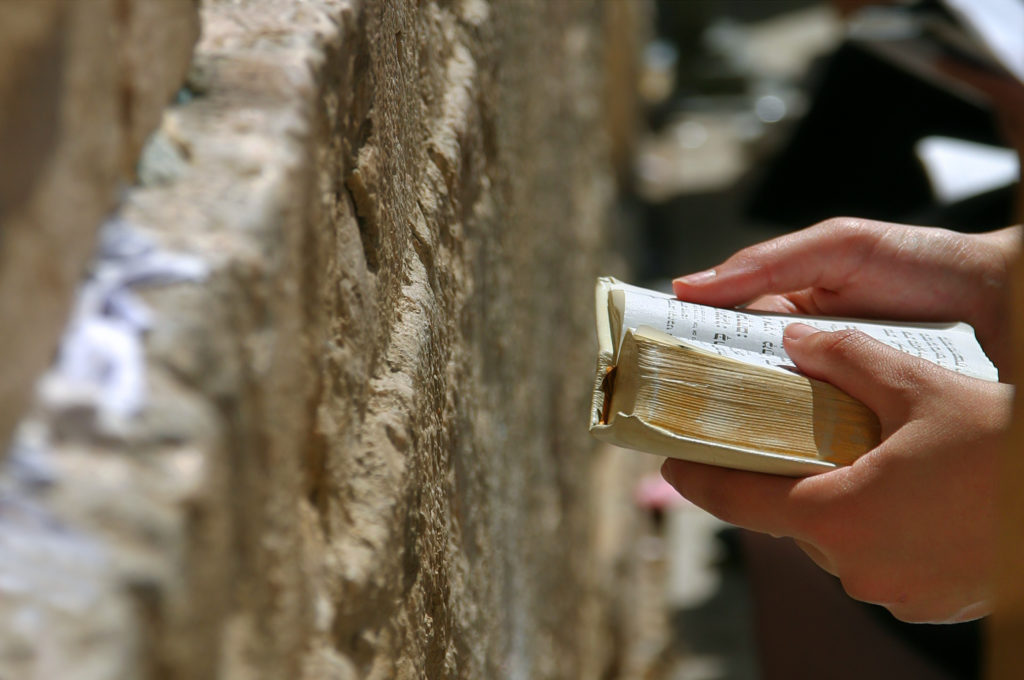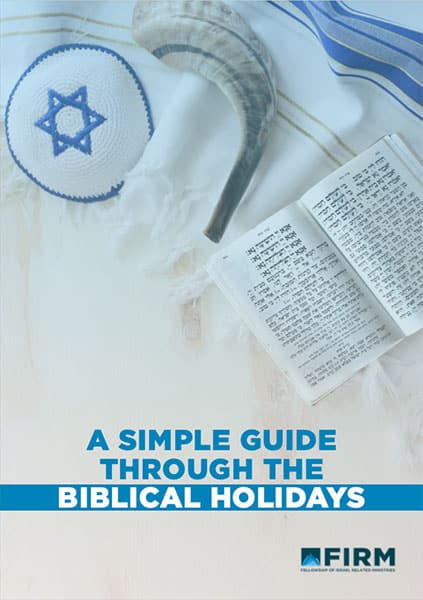What is Rosh HaShanah?
In the Bible, the day known as Rosh HaShanah is never actually called ‘a New Year’. Instead, God calls it the Feast of Trumpets (Yom Teruah in Hebrew), when He ordained to blow the shofars – ram’s horns. The sound was a reminder to repent and to encourage reflection.
Today we call this day Rosh HaShanah or the Jewish New Year (or Feast of Trumpets), interchangeably.
According to the Torah, on Rosh Hashanah every Jew is obliged to hear the sound of the shofar. So, what relevance does it have for us today? Let’s unpack the true meaning of the Jewish New Year.

Entering a New Season
Entering a new year is always meant to be special. We want to leave all our failures behind, and we look forward to new and better opportunities. Many of us treat entering a new year as a fresh start – like opening a blank slate, which we first fill only with sketches of dreams and expectations.
Over the course of the next few months we hope to turn them into beautiful memories. At this time, Jerusalem is filled with the smells of sweet foods and the sounds of the trumpets blasting.Jewish families start gathering in their homes and synagogues.
Yet, the Jewish outlook on entering a new year is quite different from the Western one.
To a Sweet New Year
Although today it is very common to wish everyone “a sweet and good year” on Rosh HaShanah, the traditional and biblical approach is a little more reverent and spiritual.
The day is not so much about celebrating, but rather meditating on one’s life and giving glory to God. The latter is most definitely a reason to be joyous, but this holiday is also a reminder of the Creator’s judgment over creation.
According to the Jewish sages, Rosh HaShanah is when time began. Traditionally it is believed that the year count started at creation, and a new year is added in the Jewish calendar on the first day of the month called Tishri (biblically, the seventh month).
The Sound of the Shofar on Rosh HaShanah
The shofar, which is more a horn than a trumpet, is a very important instrument in the history of Israel. The trumpets, according to Numbers 10:2-10, were used to summon the people or to warn of battle and approaching of the enemy. It was a plea to God for deliverance, and in a sense, that’s what the essence of Rosh HaShanah is.
Leviticus 23:23-25 states:
“And the LORD spoke to Moses, saying, ‘Speak to the people of Israel, saying, In the seventh month, on the first day of the month, you shall observe a day of solemn rest, a memorial proclaimed with the blast of trumpets, a holy convocation. You shall not do any ordinary work, and you shall present a food offering to the LORD.’”
Similarly to physical sleep, we can find ourselves in a spiritual slumber. Have you ever felt yourself becoming drowsy or fully asleep to the things of the spirit? Like your relationship with the LORD or your attention to keeping sin from creeping into your life?
I think we’re all prone to fall into that place and God knows it. That’s why the LORD gave the people of Israel a spiritual alarm clock. The LORD gave the people of Israel a spiritual alarm clock called Yom Teruah – Feast of Trumpets.
A Time of Introspection during Feast of Trumpets
The sound of the ram’s horn is a reminder that God is our Creator and King. But more than that, the shofar is our recognition that God is King of all creation as well as our Lord on a personal level. Not only as the one who began the work in us, but as the one who reigns today.
The horn invites us to reflect on our actions and to return to God. It calls for repentance, turning away from your sins, and returning to the Creator. We have forgotten the truth and daily struggles distract us from what’s really important.
With the sounds of the shofar, we are reminded to look into our souls, examine our lives, and return to the God of the Bible.God commanded this festival so that it might serve as a spiritual alarm clock for His people.
Deliverance at Rosh HaShanah
The shofar’s blast is meant to awaken the spirit from dullness and haze which so easily encompasses it. The calloused, routine, and day-to-day life is placed on hold. Instead, a “solemn assembly” is commanded in order recognize and embrace the season at hand.
The main theme of Rosh HaShanah is liberation. The sound of the shofar is a call for busy and tired people to stop and look to the heavens. Do the people fear when the trumpet blows in the city? Amos 3:6.
Blowing the shofar is meant to be a reassuring sound – reminding us that God hears and is constantly watching.
A Promised Resurrection
In the New Testament, we find the words of the apostle Paul about the future gathering of believers around the Messiah. He writes that it will begin with the resurrection of those who have fallen asleep before, and then of all the living.
He explains that this gathering will begin with the sound of a trumpet – a shofar.
“For the Lord Himself will descend from heaven with a shout, with the voice of an archangel, and with the trumpet of God. And the dead in Christ will rise first. Then we who are alive and remain shall be caught up together with them in the clouds to meet the Lord in the air. And thus we shall always be with the Lord. Therefore comfort one another with these words.” 1 Thessalonians 4: 16-18
The sound of the shofar on that day will announce the second coming of our Messiah. Apostle Paul said to encourage one another with these words.
There is no condemnation for those who live in Christ, so all the more we should desire His sanctification every day. And especially when we embark on a new year – on Rosh HaShanah.

When is Rosh HaShanah?
This unique Biblical holiday at the end of summer starts a season of teshuvah, meaning repentance. The Jewish people make amends with friends, family members, neighbors, and anyone else who they might need to forgive or ask forgiveness of.
Rosh HaShanah is the first of the high holidays, also called the ‘Ten Days of Awe’, which culminate on Yom Kippur (the Day of Atonement). It is a solemn time of introspection. But also, it is a time for repentance and seeking right standing with Elohim.
During this season of introspection, the people of Israel look inwardly at their hearts. They spend hours searching for anything that might be drawing them away from God and examining any sins that have crept in unnoticed.
The Days of Awe
During this special season consider using the spiritual alarm clock which God has established. Maybe you have a shofar lying around somewhere. If not, find a place where you can simply cry out to God.
Awaken yourself from any spiritual slumber you might have fallen into recently. Look inwardly and pray the words King David did before the LORD in Psalm 139:23-24:
“Search me, O God, and know my heart! Try me and know my thoughts! And see if there be any grievous way in me, and lead me in the way everlasting!”
The Trumpet and Messiah’s Return
The Feast of Trumpets calls the people of Israel to prepare for the Messiah’s return at the End of Days. We do not know the day or the hour of His return.
However, we can remember this holy day knowing that God is regathering His people from the four winds even now. And He will return at the sound of the trumpet, revealing Himself to the whole world!
“And He will send his angels with a loud trumpet call, and they will gather his elect from the four winds, from one end of the heavens to the other.” Matthew 24:31
What a season of celebration and expectation! During this time the Jewish people are preparing their hearts for the Feast of Trumpets by spending time in contemplation and repentance.
A Message of Salvation
Rosh HaShanah is a perfect moment to share the message of the assurance of salvation through Jesus their Messiah. He will return to set up His Kingdom on earth at the sound of a trumpet!
Let’s use this time of reflection to purify our lives and our relationships with others. Entering a new season is always a good time to seek God and listen to His voice. Rosh HaShanah can be our time to raise the standards of our lives in every aspect.
“Rosh Hashanah” literally means “head of the year” and it is the first of the 3 Jewish Fall feasts. But what does that have to do with your faith? Find out!

A Simple Guide Through the Biblical Holidays: Free PDF Download
You may know them as the “Jewish holidays,” but did you know the Bible calls them “Feasts of the LORD”?
We’ve put this guide together for you so that you have all you need to know about these holidays that God calls His own.
Articles Related to Jewish New Year
Estimated reading time: 8 minutes
